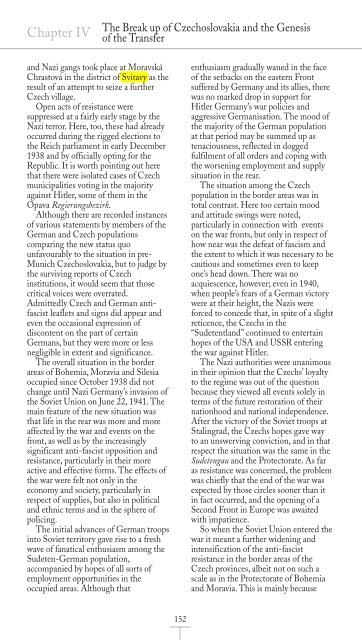the nationality of all inhabitants of the czech provinces and ...
the nationality of all inhabitants of the czech provinces and ...
the nationality of all inhabitants of the czech provinces and ...
You also want an ePaper? Increase the reach of your titles
YUMPU automatically turns print PDFs into web optimized ePapers that Google loves.
Chapter IV<br />
<strong>and</strong> Nazi gangs took place at Moravská<br />
Chrastová in <strong>the</strong> district <strong>of</strong> Svitavy as <strong>the</strong><br />
result <strong>of</strong> an attempt to seize a fur<strong>the</strong>r<br />
Czech village.<br />
Open acts <strong>of</strong> resistance were<br />
suppressed at a fairly early stage by <strong>the</strong><br />
Nazi terror. Here, too, <strong>the</strong>se had already<br />
occurred during <strong>the</strong> rigged elections to<br />
<strong>the</strong> Reich parliament in early December<br />
1938 <strong>and</strong> by <strong>of</strong>fici<strong>all</strong>y opting for <strong>the</strong><br />
Republic. It is worth pointing out here<br />
that <strong>the</strong>re were isolated cases <strong>of</strong> Czech<br />
municipalities voting in <strong>the</strong> majority<br />
against Hitler, some <strong>of</strong> <strong>the</strong>m in <strong>the</strong><br />
Opava Regierungsbezirk.<br />
Although <strong>the</strong>re are recorded instances<br />
<strong>of</strong> various statements by members <strong>of</strong> <strong>the</strong><br />
German <strong>and</strong> Czech populations<br />
comparing <strong>the</strong> new status quo<br />
unfavourably to <strong>the</strong> situation in pre-<br />
Munich Czechoslovakia, but to judge by<br />
<strong>the</strong> surviving reports <strong>of</strong> Czech<br />
institutions, it would seem that those<br />
critical voices were overrated.<br />
Admittedly Czech <strong>and</strong> German antifascist<br />
leaflets <strong>and</strong> signs did appear <strong>and</strong><br />
even <strong>the</strong> occasional expression <strong>of</strong><br />
discontent on <strong>the</strong> part <strong>of</strong> certain<br />
Germans, but <strong>the</strong>y were more or less<br />
negligible in extent <strong>and</strong> significance.<br />
The over<strong>all</strong> situation in <strong>the</strong> border<br />
areas <strong>of</strong> Bohemia, Moravia <strong>and</strong> Silesia<br />
occupied since October 1938 did not<br />
change until Nazi Germany’s invasion <strong>of</strong><br />
<strong>the</strong> Soviet Union on June 22, 1941. The<br />
main feature <strong>of</strong> <strong>the</strong> new situation was<br />
that life in <strong>the</strong> rear was more <strong>and</strong> more<br />
affected by <strong>the</strong> war <strong>and</strong> events on <strong>the</strong><br />
front, as well as by <strong>the</strong> increasingly<br />
significant anti-fascist opposition <strong>and</strong><br />
resistance, particularly in <strong>the</strong>ir more<br />
active <strong>and</strong> effective forms. The effects <strong>of</strong><br />
<strong>the</strong> war were felt not only in <strong>the</strong><br />
economy <strong>and</strong> society, particularly in<br />
respect <strong>of</strong> supplies, but also in political<br />
<strong>and</strong> ethnic terms <strong>and</strong> in <strong>the</strong> sphere <strong>of</strong><br />
policing.<br />
The initial advances <strong>of</strong> German troops<br />
into Soviet territory gave rise to a fresh<br />
wave <strong>of</strong> fanatical enthusiasm among <strong>the</strong><br />
Sudeten-German population,<br />
accompanied by hopes <strong>of</strong> <strong>all</strong> sorts <strong>of</strong><br />
employment opportunities in <strong>the</strong><br />
occupied areas. Although that<br />
The Break up <strong>of</strong> Czechoslovakia <strong>and</strong> <strong>the</strong> Genesis<br />
<strong>of</strong> <strong>the</strong> Transfer<br />
152<br />
enthusiasm gradu<strong>all</strong>y waned in <strong>the</strong> face<br />
<strong>of</strong> <strong>the</strong> setbacks on <strong>the</strong> eastern Front<br />
suffered by Germany <strong>and</strong> its <strong>all</strong>ies, <strong>the</strong>re<br />
was no marked drop in support for<br />
Hitler Germany’s war policies <strong>and</strong><br />
aggressive Germanisation. The mood <strong>of</strong><br />
<strong>the</strong> majority <strong>of</strong> <strong>the</strong> German population<br />
at that period may be summed up as<br />
tenaciousness, reflected in dogged<br />
fulfilment <strong>of</strong> <strong>all</strong> orders <strong>and</strong> coping with<br />
<strong>the</strong> worsening employment <strong>and</strong> supply<br />
situation in <strong>the</strong> rear.<br />
The situation among <strong>the</strong> Czech<br />
population in <strong>the</strong> border areas was in<br />
total contrast. Here too certain mood<br />
<strong>and</strong> attitude swings were noted,<br />
particularly in connection with events<br />
on <strong>the</strong> war fronts, but only in respect <strong>of</strong><br />
how near was <strong>the</strong> defeat <strong>of</strong> fascism <strong>and</strong><br />
<strong>the</strong> extent to which it was necessary to be<br />
cautious <strong>and</strong> sometimes even to keep<br />
one’s head down. There was no<br />
acquiescence, however; even in 1940,<br />
when people’s fears <strong>of</strong> a German victory<br />
were at <strong>the</strong>ir height, <strong>the</strong> Nazis were<br />
forced to concede that, in spite <strong>of</strong> a slight<br />
reticence, <strong>the</strong> Czechs in <strong>the</strong><br />
“Sudetentl<strong>and</strong>” continued to entertain<br />
hopes <strong>of</strong> <strong>the</strong> USA <strong>and</strong> USSR entering<br />
<strong>the</strong> war against Hitler.<br />
The Nazi authorities were unanimous<br />
in <strong>the</strong>ir opinion that <strong>the</strong> Czechs’ loyalty<br />
to <strong>the</strong> regime was out <strong>of</strong> <strong>the</strong> question<br />
because <strong>the</strong>y viewed <strong>all</strong> events solely in<br />
terms <strong>of</strong> <strong>the</strong> future restoration <strong>of</strong> <strong>the</strong>ir<br />
nationhood <strong>and</strong> national independence.<br />
After <strong>the</strong> victory <strong>of</strong> <strong>the</strong> Soviet troops at<br />
Stalingrad, <strong>the</strong> Czechs hopes gave way<br />
to an unswerving conviction, <strong>and</strong> in that<br />
respect <strong>the</strong> situation was <strong>the</strong> same in <strong>the</strong><br />
Sudetengau <strong>and</strong> <strong>the</strong> Protectorate. As far<br />
as resistance was concerned, <strong>the</strong> problem<br />
was chiefly that <strong>the</strong> end <strong>of</strong> <strong>the</strong> war was<br />
expected by those circles sooner than it<br />
in fact occurred, <strong>and</strong> <strong>the</strong> opening <strong>of</strong> a<br />
Second Front in Europe was awaited<br />
with impatience.<br />
So when <strong>the</strong> Soviet Union entered <strong>the</strong><br />
war it meant a fur<strong>the</strong>r widening <strong>and</strong><br />
intensification <strong>of</strong> <strong>the</strong> anti-fascist<br />
resistance in <strong>the</strong> border areas <strong>of</strong> <strong>the</strong><br />
Czech <strong>provinces</strong>, albeit not on such a<br />
scale as in <strong>the</strong> Protectorate <strong>of</strong> Bohemia<br />
<strong>and</strong> Moravia. This is mainly because


